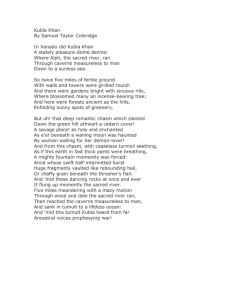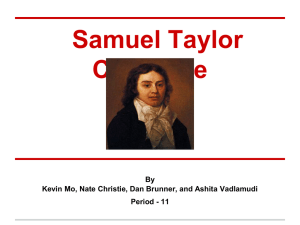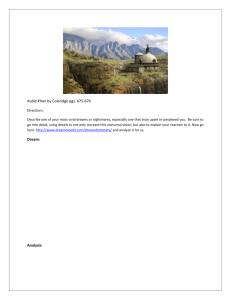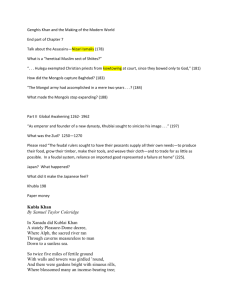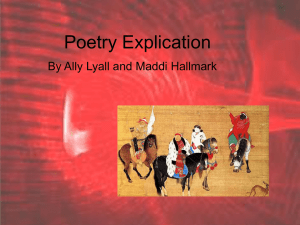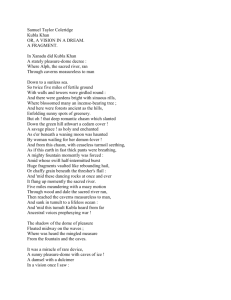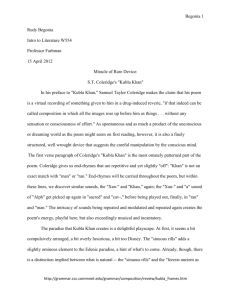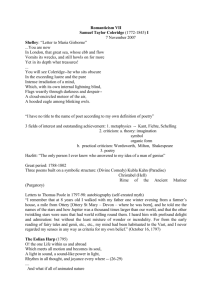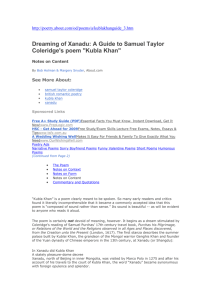Kubla Khan
advertisement
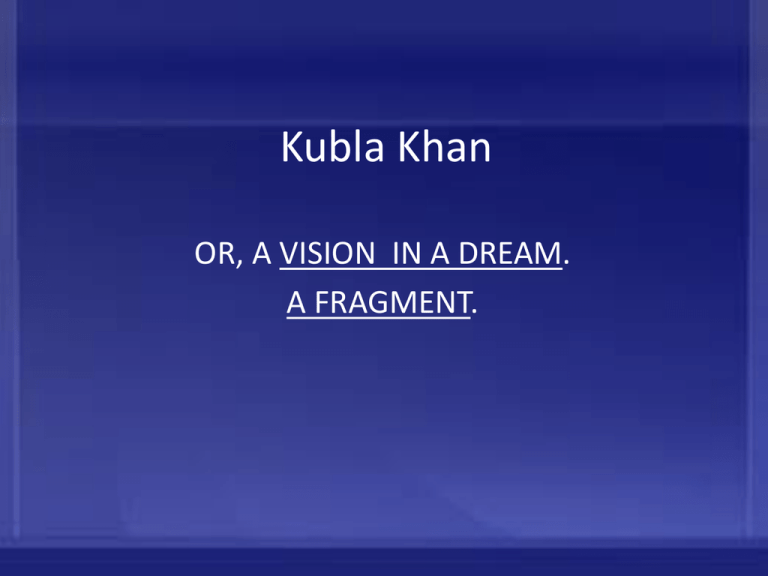
Kubla Khan OR, A VISION IN A DREAM. A FRAGMENT. 1 part: the description of the place KublaKhan Khan In Xanadu did Kubla A stately pleasure dome decree: Where Alph Alph, the sacred river, ran caverns measureless measureless to to man man Through caverns Down to a sunless sunless sea.. sea. hyperbole This big, dramatic riveroftakes over most of the first half of First letter the Greek alphabet They areThis the opposite of time the warm, happy palace. They the poem. is the only its name is mentioned according to freezing, mythology, the beginning of life andItlanguage are dramatic, and represent It casts a shadow overunderground, these first few lines. also Kublai Khan (1215-1294) was "theisfifth ofWe theget Mongol great khans, everything the pleasure dome not. a sense gives usofathe sense of being in an imaginary landscape, Noticegrandson how Coleridge is already stepping away from history: he isis legendary Mongol conqueror Genghis Khan. He There's certainly no river in Mongolia by this name Alpheus = the classical underground river; the sacred river. that thisthis landscape is could both huge and unknowable. because where a and sea always "sunless" transforming place,else this person, this storybeinto his own best known in the West as the Cublai Kaan of Marco Polo who creation. "Kubla Khan" isormain definitely journeys of the Xanadu, and helped to images startathe legend of itsthe magnificence and never bright cheerful ?poem Itvisited gives us the poem's of theabout force and excitement mindof and imagination. thethe natural world. While other places may be quiet or safe or calm, the river is noisy, active, and even a little dangerous. So twice five miles of fertile ground With walls walls and and towers towers were girdled round: sinuous rills, rills And there were gardens bright with sinuous Where blossomed many an incense-bearing tree; And here were forests ancient as the hills, Enfolding sunny spots of greenery. The natural world outside is wild and strange, but within the speaker takes us away those gloomy, TheThe language gets fancy here. from Aand "sinuous rill“ is really palace walls things are peaceful protected. justendless a twistycaverns, stream. and tells us a little bit about the gardensoften around the palace.language to illustrate simple Coleridge uses beautiful Everything about this place feels safe and underlying concepts. happy. "fertile," the gardens arestrange TheIt's contrast between the scary, "bright," smellfamiliar good cavernseven andthe thetrees pleasant, space around the palace is striking chasm which slanted But oh! that deep romantic chasm Down the green hill athwart a cedarn cover ! A savage place ! as holy and enchanted As e'er beneath a waning moon was haunted By woman wailing for her demon lover! Maybe a ghost, since she haunts the place. Maybe she has been cursed, or has had a spell cast on her, and she has fallen in love The riverTypical falls like cascade downliterature. thechanges side of and Note the poet, adding theathe word "demon“, with how an evil spirit. of Romantic one hill, cutting aAlph, "deep chasm," oracanyon, Back to the riverwas is for beginning deepens this image. If she justwhich wailing plain to old "lover," Thewould speaker isn't saying anysoofstrange these things are there in the through it. not seem almost likethat a character in this that be sad, but nearly andpoem exciting. poem; he's saying that this is the kind of place where they would be atspeaker home. is very excited when he talks about the river as all The those exclamations points suggest. The speaker is using them to let us know just how romantic and spooky the chasm really is. And from this chasm, with ceaseless turmoil seething, As if this earth in fast thick pants were breathing, A mighty fountain momently was forced: Amid whose swift half-intermitted burst reboundinghail, hail Huge fragments vaulted like rebounding similes Or chaffy chaffy grain grain beneath the thresher's flail: And `mid these dancing rocks at once and ever It flung up momently the sacred river. One reading of the poem: river isdome= not seen as something TheThe pleasure imagination and poetry but asnegative something that( is created Thecontinuous, natural world= reality savage place) each moment. in contrast with the world produced by imagination The mighty fountain= the poetic power alliteration Five m iles meandering with a mazy motion Through wood and dale the sacred river ran, measureless to to man, man, Then reached the caverns measureless lifelessocean: ocean And sank in tumult to a lifeless First we have an image of the river rushing down a deep canyon cut into a Here we see the caverns again, described in exactly the same woodedThe hillside. The water is moving fast and reproduces furious, almost like a Different words, idea. murmuring sound ofsame these words the lazy, way: "measureless to man." Thegloomy repetition of this phrase waterfall; the river then flattens outriver andatturns into a proper flowing slow-moving feeling of the this home moment in sense theriver, poem emphasizes their importance and drives their of gently through Xanadu for five miles until it reaches some "caverns.” mystery and depth. The other settings in the poem tend to be active and alive. The forest is took sunny, river is noisy, the he's dometaking is warm, even again, the caves The speaker us the up to peak, and now us down circling deep and spooky icy. Theimages ocean,that however is the justpoem. an empty, open reaches space. now backare to the quiet, started The river It might make think a little bit of the Underworld, a place where the flat plain of the us valley where Xanadu is located. things simply end. And `mid this tumult KubIa heard from far Ancestral voices prophesying war! This is Genghis Khan's grandson, after all, so he probably spent aThis lot of time thinking warfrom or….the river, and new image takesabout us away into the even wilder second half of the poem. ......the ancestral voices symbolize the voice from the rational world,a menace against the miracle of art ,that is the peaceful world created by Kubla Khan. The “walls and towers” built by Kubla Khan could not even protect himself from the outer world, suggesting that imagination is only a temporary relief from reality. The shadow of the dome of pleasure Floated midway on the waves; Where was heard the mingled measure From the fountain and the caves. It was a miracle of rare device, ice! A sunny pleasure dome with caves of ice! There's a whole world of contrasts between the dome and the caverns: Natural vs. man-made, symmetrical and irregular, sunny The reflection of the dome on the water might allude and frozen. to thegives Platonic conception material realityclashing as This is what the poem a lot ofof itsthe energy: opposites by light fromkind the world of Ideas (see togethershadows and thencast making a weird of harmony. Plato's cavern). In this way Kubla's dome would be the Kubla Khan's pleasure-dome is the central structure thesea poem. perfect idea of poetic creation projected oninthe of With its combination of sacred and profane, of natural and artificial elements, appearances. it represents first of all that reconciliation of opposites, of the many into one, which Coleridge considered the task of poetic imagination. The poet's energy should therefore be directed to the creation of the "dome" like Kubla's 2 part: Oniric vision of the poet A damsel with a dulcimer In a vision once I saw: It was an Abyssinian maid, And on her dulcimer she played, Singing of Mount Abora. For example, where and what is Mt. Abora? Without any warning, the speaker changes subject. sudden change from 3°the to 1° person He starts to Some people think theIspeaker is referring describe another vision that had. to a real place in Ethiopia, =the he poetonce some biblical reference, andthree others tie itabout to a place that Milton In thisthink visionit's heasees a girl. He tells us things her, in three mentions in Paradise Lost. lines: YouShe could ask the same questions theofother parts of this vision. 1) was Abyssinian (that's an about old way saying Ethiopian). WhyShe is she Ethiopia, what (an doesinstrument the dulcimer symbolize? 2) wasfrom playing a dulcimer with strings). In one all dreams anda visions are private, and(a they can't be 3) Shesense was singing about place called Mt. Abora name that completely explained. That sense of mystery is part of what makes this Coleridge made up). poem beautiful. How can we interpret these lines? Could I revive within me Her symphony and song, To such a deep delight `twould win me, That with music loud and long, I would build that dome in air, That sunny dome! those caves of ice! And all who heard should see them there, If he could revive that music then he would be able to create the perfect work of art: the pleasure-dome that Kubla had ordered Nowbethe speaker lookstoback on the the spiritual powerfulquality music he heard would built "in air", signify of the poetic in that unifying vision. the opposites — "That sunny dome! those creation, He of can describe us, but he can't get back to caves ice!" — inita to harmonious wholereally in natural adherence to that intense theexperiencing music from which it tookfeeling its origin. And all should cry, Beware! Beware! His flashing eyes, his floating hair! Weave Weaveaacircle circle round him thrice, And close your eyes with holy dread, For he on honeydew hath fed, And drunk the milk of Paradise. The figure represented is characterised by flashing eyes which might have a blinding effect on humans , floating hair, isand finally, by the The poet portrayed by the last lines of the poem the prophet-bard, The second act is to close your eyes The speaker demands of the reader or listener to with perform acts of assumption that he on honey-dew [has] fed And drunk the milk ofthe who was to become popular in the Romantic Age, different from holy i.e. with fear towards afirst act, great reverence ordread, fear entitled towards this figure: the Paradise; thus he has been to share the privileges of which gods (for the common human beings for his prophetic qualities, feared by them superhuman being. reminds of symbolic gestures performed during a religious or magic ancient gods' consuming ambrosia and nectar). his insight into the divine. conjuration or incantation, is to weave a circle round him thrice. A person from Porlock ? Improbabilities in Coleridge's story 1934 a manuscript was discovered with significant variants ? Coleridge spent a good deal of time revising it before publication Purchas. His pilgrimage (1613) a rare and very large volume ? he could hardly have taken with him to a lonely farmhouse Why did he invent this story? 1 Coleridge seems to have had an intense desire to be seen as an instinctive, spontaneous poet, who composed without difficulty; In fact, he took enormous pains over his poems, and wrote so little, according to Wordsworth, because of the labour that writing cost him. 2 Another possibility is that he was aware that his contemporaries would find the poem meaningless — it tells no story, and consists only of a series of exotic and apparently unrelated images. Thus he invented the story of unconscious composition as a defence against the charge of writing non-sense What does it mean then? It is unknown whether the poem was meant to have a particular meaning. 1 It is possible that Coleridge wanted the individual reader to use his/her own imagination to reach an interpretation of it. 2 The poem could be about language: "Alph, the sacred river" is the river of language . This river springs from underground, from the unconscious, and the magical pleasure dome built where the river runs represents poetry. 3 The poem could be about the two different kinds of imagination that Coleridge distinguished in his criticism. Kubla's palace is the product of the decorative 'fancy', whereas the river, which bursts irresistibly from underground represents the true poetic imagination, an irresistible, even dangerous force. Thank you
